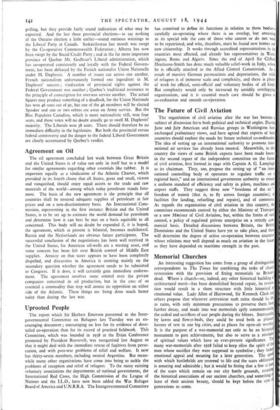Agreement on Oil
The oil agreement _concluded last week between Great Britain and the United States is of value not only in itself but as a model for similar agreements regarding other essentials like rubber. It is important equally as a vindication of the Atlantic Charter, which provided in its fourth clause that all States, great and small, victors and vanquished, should enjoy equal access to the trade and raw materials of the world—among which today petroleum stands fore- most. The basis of the new agreement is the principle that all countries shall be ensured adequate supplies of petroleum at fair prices and on a non-discriminatory basis. An International Com- mission, representing in the first instance Britain and the United States, is to be set up to estimate the world demand for petroleum and determine how it can best be met on a basis equitable to all concerned. This body will no doubt be expanded if, it is hoped, the agreement, which at present is bilateral, becomes multilateral. Russia and the Netherlands are obvious future participants. The successful conclusion of the negotiations has been well received in the United States, for American oil-wells are a wasting asset, and some concern has been felt over British control of Middle East supplies. Anxiety on that score appears to have been completely dispelled, and discussion in America is centring mainly on the secondary question whether the agreement needs to be submitted to Congress. If it does, it will certainly gain immediate endorse- ment. The agreement involves some control over the private companies concerned in oil production, but in the case of so essential a commodity that step will arouse no opposition on either side of the Atlantic. These things are being done much better today than during the last war.






















 Previous page
Previous page